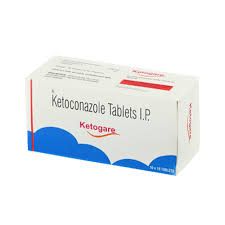Ketoconazole is an antifungal medication used to treat a variety of fungal infections. It is particularly effective against infections caused by fungi such as Candida, Blastomyces, and Histoplasma species. The formulation of 10x10 tablets typically indicates a packaging of 10 tablets in a box, each containing a standard dose of ketoconazole.
Key Features
- Active Ingredient: Ketoconazole, which is known for its ability to inhibit the synthesis of ergosterol, a crucial component of fungal cell membranes.
- Dosage Forms: Available in tablet form, often in strengths such as 200 mg or 400 mg per tablet, depending on the specific product.
Indications
Ketoconazole tablets are indicated for:
- Fungal Infections: Treatment of systemic fungal infections, including candidiasis and dermatophyte infections.
- Topical Fungal Infections: Often used in conjunction with topical formulations for comprehensive treatment.
- Seborrheic Dermatitis: May be prescribed for skin conditions caused by fungal overgrowth.
Mechanism of Action
- Antifungal Activity: Ketoconazole works by disrupting the fungal cell membrane's integrity through inhibition of ergosterol synthesis. This leads to increased permeability and ultimately results in cell death.
Dosage and Administration
- Typical Dosage: The usual adult dose ranges from 200 mg to 400 mg daily, depending on the severity of the infection and the doctor's recommendations.
- Administration Instructions: Tablets should be taken with food to enhance absorption and minimize gastrointestinal side effects.
Side Effects
Common side effects may include:
- Nausea or vomiting
- Abdominal pain
- Dizziness or headache
- Liver enzyme elevations (in rare cases)
Serious side effects can include:
- Severe allergic reactions (e.g., rash, itching, difficulty breathing)
- Liver toxicity, requiring monitoring during treatment
Precautions
- Liver Function Monitoring: Regular liver function tests may be necessary due to potential hepatotoxicity.
- Drug Interactions: Ketoconazole can interact with other medications, particularly those metabolized by the liver (CYP3A4 inhibitors).
- Pregnancy and Breastfeeding: Consult a healthcare provider before use if pregnant or breastfeeding.

